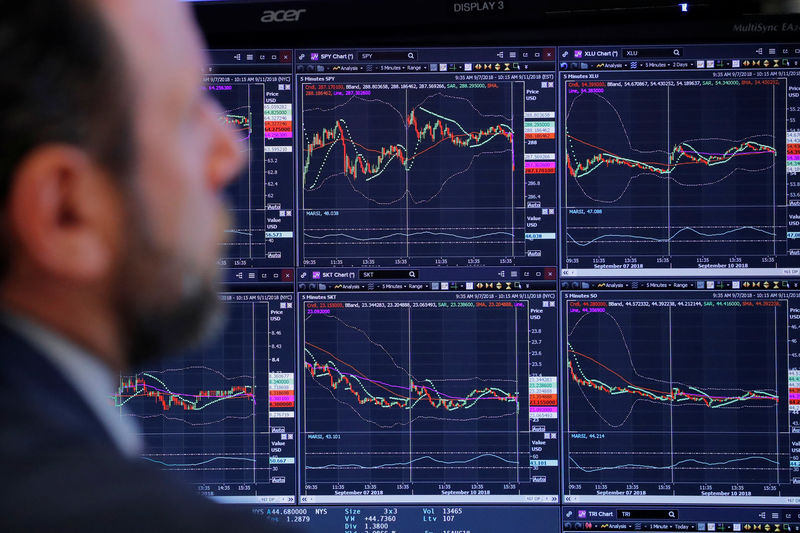Investing.com - A Trump Administration decision to delay the imposition of tariffs on goods imported from China set off a huge rally Tuesday that reclaimed most of Monday's losses.
The Administration delayed the imposition of tariffs on some goods until Dec. 15, which should give retailers plenty of time to stock their shelves.
"We're doing this for the Christmas season," President Donald Trump told reporters
The rally sent the S&P 500 up 1.48%, the Dow Jones industrials up 1.44% and the Nasdaq Composite up nearly 2%.
The gains for the S&P 500 and the Nasdaq -- 42.57 points and 153 points, respectively -- recovered all of Monday's losses. The Dow, which gained about 373 points, ended the day about 7.5 points short of a total recovery from its 380-point loss on Monday.
The Nasdaq 100 index, which has a concentration in big tech, jumped more than 2.2%. The index more than recovered its Monday loss, ending the day 82 points ahead of Friday's close.
Apple (NASDAQ:AAPL), electronics retailer Best Buy (NYSE:BBY), Nike (NYSE:NKE), Microsoft (NASDAQ:MSFT) Intel (NASDAQ:INTC), Cisco Systems (NASDAQ:CSCO) and Caterpillar (NYSE:CAT) were among the biggest winners from the decision.
Apple rose 4.2% and contributed nearly 58 points to the Dow by itself. It was also the sixth-best performer among Nasdaq 100 stocks.
The tariff delays were concentrated on a wide variety of goods that are big sellers in the holiday shopping season, including cell phones, tennis racquets, video game consoles, computer keyboards, footware and clothing.
The White House had vowed to impose the tariffs on Sept. 1, but the announcement in late July unnerved markets, unleashing wild swings in U.S. stock prices. Tariffs will be imposed Sept. 1, on a number of products, including food products.
The Dow was up nearly 530 points before some traders sold to lock in profits. Twenty-seven of the 30 Dow stocks were higher. Two of the decliners -- Boeing (NYSE:BA) and IBM (NYSE:IBM) -- were off very slightly.
Worries that China was about to send troops into Hong Kong to quell local protests appeared to have a modest effect on the markets, but analysts said markets would react unfavorably to such news.
Crude oil prices were higher as the rally took off. West Texas Intermediate crude rose $2.17 to $57.10 a barrel. Brent crude rose $2.73 to $61.30 a barrel.
Gold, however, fell back, with the December futures contract settling at $1,512.30 an ounce, off $5.
But there remained worries about global growth as the trade fight between Washington and Beijing grinds on. Investors could see it in the narrowing spread between 2-year Treasury securities and the 10-year note. Many analysts believe a 10-year that's less than a 2-year yield (inversion) is a strong signal that a recession is coming.
The 10-Year Treasury yield closed at 1.702%, after falling to as low as 1.618%. The 2-Year Treasury yield rose to 1.673%, bring the spread to just 2.9 basis points, or 2.9 one-hundredths of a percentage point.
Technology stocks, consumer discretionary stocks, communications services shares (which include Facebook (NASDAQ:FB) and Google parent Alphabet (NASDAQ:GOOGL)), were among the strongest sectors. Realvestate and utility stocks were basically flat.
Department store giant Macy’s (NYSE:M) and Briggs & Stratton (NYSE:BGG) are among companies reporting quarterly results on Wednesday.
Winners and Losers in the S&P 500
Cyber-security company Symantec (NASDAQ:SYMC), Best Buy (NYSE:BBY), Micron Technology (NASDAQ:MU) and discount retailer Dollar Tree (NASDAQ:DLTR) were among the top S&P 500 performers on Tuesday.
Utility giant Southern Company (NYSE:SO), oil-and-gas producer Cabot Oil & Gas (NYSE:COG), oil-services company Helmerich and Payne (NYSE:HP) and apartment developer United Dominion Realty Trust (NYSE:UDR) were among the weakest S&P 500 performers.
